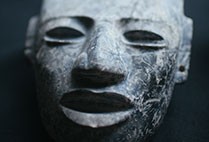For a decade, Christopher Robinson and Gavin Kovite have been partners in crimes comedic and literary, riffing off each other as they cooked up offbeat stories, sketches, and ultimately, the novel War of the Encyclopaedists, published this spring by Scribner to widespread critical praise. New York Times critic Michiko Kakutani says the coauthors have created a “captivating coming-of-age novel that is, by turns, funny and sad and elegiac—a novel” offering “some telling portraits of a couple of millennials trying to grope their way toward adulthood.”
With an epigraph by Pliny the Elder, “the original encyclopaedist,” the novel tracks the diverging paths of Seattle-bred Halifax Corderoy and Mickey Montauk. If, as Robinson (GRS’07) and Kovite insist, the characters are not exactly doppelgängers for themselves, they are at the very least fleshed out from the bones of the writers’ origins and histories. After the novel introduces us to a cast of young, lost, but acerbically clever souls, the freewheeling, joined-at-the-hip buds depart for different worlds: Corderoy to graduate school at Boston University, and Montauk, a lieutenant in the Army Reserve, to war-fogged Baghdad.
The story follows these “glorious fools born into a vacuum of need,” without a clue as to who they really are, as they leave their life as wry hipsters (the Encyclopaedists) and the shabby comforts of the “Encyclopad” to witness senseless, surreal death and mayhem, and senseless, surreal “post-structural” academic pretense.
Although their far-flung existences are linked by Montauk’s spontaneous marriage of convenience to Corderoy’s ex-girlfriend, her appearance in Boston, and Corderoy’s Boston roommate popping up in Iraq (read the book), the pair communicate with each other only through edits to a Wikipedia entry that began as a whimsical meta statement on the early 2000s blossoming of internet culture. This touch and others, including a series of darkly comic transcripts of military interviews with potential witnesses in the murder of an Iraqi translator, prompted Kirkus Reviews to call the novel “Shandy-esque.” It’s a wild ride, but one that takes its time plotwise and ends without any tidy resolution.
The authors met in 2005 in an undergraduate poetry program in Rome and roomed together in New York City, where Robinson taught creative writing at Hunter College and Kovite earned a law degree at New York University.
In reviewing War of the Encyclopaedists, critics have indulged in a kind of parlor game, trying to identify which author wrote what. The exercise is pointless, they say. While their real-life experiences inform the characters’ travails in both grad school and Iraq, the writing was truly a collaborative effort, says Robinson, who has an MFA from Hunter College and was a Yale Younger Poets Prize finalist. (Kovite recently completed his post as a JAG lawyer.)
Bostonia spoke with the authors from Detroit, where they are researching a new novel.
Bostonia: Tell us how you came to collaborate on the book.
Robinson: Gavin and I began our collaboration about 10 years ago, after we met at a study abroad program in Rome and were reading Keats. We became quick friends and developed a tendency to make up sketch comedy routines. Somehow, when we got back to Seattle, it turned into us writing a mystery novel. We spent about four and a half years writing that novel, set in 1800s Egypt, a side project while I was at BU and Gavin was in law school. Eventually, after failing to sell it, we just shoved it into a drawer and decided to write something closer to our experience.
How does the process work?
Robinson: Basically we sit down together, hang out, drink beers, or go on bike rides kicking ideas around, come up with characters and plot, then hash out most of our differences. It doesn’t progress unless we’re both excited, with a shared vision.
Then I’d codify the plot on a spreadsheet and divvy up chapters. Gavin wrote the Baghdad drafts and I wrote the Boston ones, then we’d swap and revise, then swap and revise again, and sometimes we wrote scenes together hunched over the same laptop. We rewrote the end five different times. We got to the point where we could fluidly write a paragraph as one writer.
What sorts of things did you argue about?
Kovite: The main tension was, I was in law school and writing wasn’t my main thing. Chris was more of a professional writer; he got more parts of the book done.
Robinson: When Gavin says I was a professional writer, he means I was a homeless vagabond living in writers’ colonies, doing everything I could to not have a job, which was psychologically destructive. My relationships fell apart, I suffered from depression, but the plus side was I had a ton of time to write.
How long did it take?
Robinson: We began in March 2009 and we sold the book in October 2013. That was followed by a whole year of revisions and editing.
New York Times critic Michiko Kakutani, a famously tough customer, wrote a favorable review. How did that feel?
Kovite: I was on active duty at the time, so I didn’t know until many hours later because I was in this war game exercise. A friend called and was freaking out.
Robinson: Scribner told me a week before that it was a possibility the Times would review the book, but they didn’t know what day. I actually really appreciate that we didn’t have that information. I would’ve obsessed and been sleepless the night before. I was floating for a week after that. It wears off after a while, though. Some random person on Goodreads doesn’t like the book, and that makes me sad.
One reviewer described Halifax as part Holden Caulfield. Is his name some kind of encryption? And where did the name Mickey Montauk come from?
Robinson: Those names are salvaged from two minor characters in the first novel, which had two balloonists from the Union Army balloon corps, who would observe battlefields from above. The characters, who defected and went to Egypt, were named Cyrus Corjery and Sirus Montauk, loose ciphers of us.
The Iraq chapters are reminiscent of powerful war writing, like Philip Caputo’s A Rumor of War and Ron Kovic’s Born on the Fourth of July. What makes writing about war really resonate, and how does the careful use of humor enrich it?
Kovite: I enjoy writing humor and I think military life is funny: young guys in similar outfits. I guess the author who influenced me most is Thomas Pynchon, who wrote really funny scenes with weird little details, which is kind of the way I think. I tried not to go too far and Chris reins me in. And some of the particularly funny stuff came from people I knew there.
Tell us about the use of the Wikipedia entries as a plot device.
Robinson: From the very first document, the Wikipedia concept was in there. It began as a conceptually motivated thing where we wanted to explore the subjectivity of knowledge, how that functions for a generation, and how the idea of authority shifts from a central figure to a crowd-sourced knowledge base. With the rise of social media, everyone is now authoring their own content. Gavin and I both had blogged, and suddenly all our friends were making content for us to read. It was a new thing. It puts the emphasis on self-definition. One of the biggest challenges for millennials is figuring out what they want to do, because their narratives didn’t pan out. It began in that sense, but as we wrote the book we realized that it was a way for the characters to communicate with each other. They could share their deep emotional thoughts as long as it was veiled in academic language.
Were these the readers you had in mind?
Kovite: We first wrote it with a reader in mind who was somewhat like us, but later we tried to make it a little more universal, with a little less navel gazing. I do think that the people who have heard this is the best book ever tend to be our age.
Robinson: My mom and my aunt said they liked the book but didn’t like the ending. They wanted something that wrapped up a little more, that didn’t end on a note of uncertainty. It was important for us to not have anything tied up in a neat little bow. But a lot of the work we did to broaden the book’s appeal was removing things.
Such as?
Robinson: We took out a masturbation scene.
Do readers often assume you each wrote alternate chapters?
Robinson: We do get asked about that a lot. Some people will say the seams really show, that you can tell that one guy wrote this part and the other guy wrote the other part, and they are often wrong. One reviewer was certain Gavin wrote a section, but I wrote it. People have preconceptions about what a coauthored book is like. But we spend so much time together, we’ve been writing together for so many years, that we learned what the narrator of the book sounds like and we can do an impersonation of that narrator. It’s our joint voice, which is different than our solo voices.
Chris, who were your mentors at BU?
The person I spent the most time with was Pulitzer Prize–winning poet Louise Glück, a former visiting professor in BU’s Creative Writing Program and former US poet laureate. Ever since leaving BU I go back and visit Louise whenever I can, and I show her some poems, which is really generous of her. The other person was John Paul Riquelme, a College of Arts & Sciences professor of English, who taught a Joyce class, my favorite. He’s a brilliant guy and some of the stuff I wrote for him made it into the book, including Corderoy’s essay.
Whose work do you love to read?
Kovite: I probably read more nonfiction than fiction, great storytellers like Barbara Tuchman and William Manchester. But David Foster Wallace is my favorite hands down.
Robinson: I read a lot of short fiction and poetry. I love George Saunders; he’s probably my top short-fiction writer, and I love Louise Glück and Terrance Hayes.














































Related Stories
Real-Life Wrongful Conviction Inspires Dick Lehr’s YA Novel
New book by COM prof a departure for best-selling author
In LAW Prof’s First Novel, a SCOTUS Gone Haywire
Jay Wexler’s Tuttle in the Balance inspired by clerk years
Five Famous Alums: Writers
Pulitzer winners and best sellers
Post Your Comment